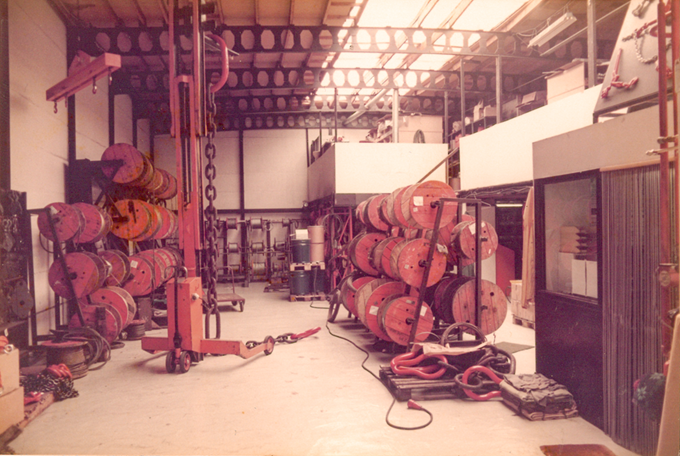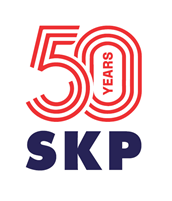“Paul, the first ten years are the worst ”
“Starting from scratch,” is how founder Paul Put remembers the start-up of SKP in 1975. Son and current manager Tom talks about “going all-in.” In other words: the decision to start a trade in hoisting materials based on steel cables in Limburg – far away from the booming business in the port of Antwerp – was far from a risk-free gamble.
Paul Put: “I wanted to invest in a cable press machine to press hooks onto steel cables, among other things , a huge investment. A good friend of mine, one of the very first master butchers in our country, warned me when I shared my plans with him. 'Paul,' he said, 'the first ten years are always the worst . As soon as they've passed, you're off.' He certainly wasn't wrong, because we also started right during the global oil crisis. In 1984, we also missed out on an annual contract with the Kempische Steenkoolmijnen, which at the time accounted for a good 15% of the annual turnover.”
“But we made it all the way through and, to be honest, I always believed in it. Because I had worked in the steel world before and I saw with my own eyes how poor the supply of steel cables was in Limburg. So I decided to take the leap, from a warehouse of just 150 m2 on the Kempische Steenweg in Hasselt.
“Father's business was literally my playground”

A period that Tom still remembers very well. If only because of the adventurous setups in the very first SKP workshop.
Tom Put: “As a child, I grew up with a warehouse in the backyard and was even allowed to help load and unload deliveries every now and then. That hall was literally my playground, with all those rolls full of steel cables. When I got a bit older, I was allowed to park the vans and as soon as I got my driver's license, I went out on the road for my father.”
“For years I did that in the company of my grandfather. He was my father’s very first employee. Of course I have very fond memories of that time. We had the greatest fun together and eventually knew all the roads in Limburg by heart. I also learned a great deal from my father on the road. How exactly does the world of steel cables and lifting materials work? Why do we work with manufacturer A and not manufacturer B? Which products do we ignore and which do we trust 100%? I learned it all in the truck.”
“It took 5 years to prepare the takeover”
However, Tom had not originally planned to take over his father's business.
Paul Put: “Tom decided to study Finance, something completely different. Despite the banks trying to recruit him, he still seemed to have doubts.”
Tom Put: “I turned out to be a late bloomer (laughs) . At one point my father asked me if I wanted to come and work for him after all. I decided to take the leap and never left the company.”
Paul Put: “I am proud of the path that Tom has taken here at SKP, because I was surprised when he said that he wanted to come and work for us. But look, he threw himself into it right away and has filled almost all the jobs here: warehouseman, head warehouseman, salesperson in the internal service, buyer, representative, you name it. Up to and including the manager that he is today.”
Tom Put: “I am still happy that I, but also my sisters, were given the opportunity to freely discover where our interests lay and where we wanted to grow professionally. Hats off to my father himself for indicating that it was time to pass the torch to someone else. The fact that it took five years before everything was finalized was precisely because everyone was given the time to make the right decisions. And we really needed that time.”

Discover 50 years of SKP